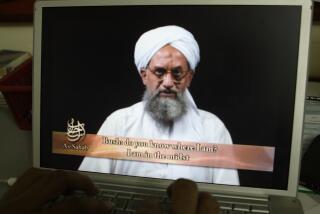Al-Zawahri May Pilot al-Qaida’s Ideology
- Share via
ISLAMABAD, Pakistan — Ayman al-Zawahri gave up a medical career in Egypt to pursue a life of religious fanaticism and became the No. 2 figure in the world’s most feared terror group.
Al-Zawahri is thought to have provided much of the ideology driving al-Qaida, just as Mohammed Atef provided operational leadership before being killed in late 2001. The two Egyptians became Osama bin Laden’s top lieutenants when their faction of Egyptian Islamic Jihad merged with his network in 1998.
While bin Laden offered money and charisma to al-Qaida, al-Zawahri, now 52, brought cunning and experience in leading militant movements.
Often seen beside bin Laden in videos released to Arab television networks, the bespectacled former surgeon was also thought to serve as the al-Qaida leader’s personal physician.
Egyptian Islamic Jihad was believed behind the assassination of President Anwar Sadat during a Cairo military parade in 1981. It was blamed in several assassination attempts on other senior Egyptian politicians in the 1990s, and claimed responsibility for the 1996 bombing of the Egyptian Embassy in Islamabad. Al-Zawahri was sentenced to death in absentia in the latter cases.
He was indicted in the United States for his alleged role in the 1998 bombings of the U.S. embassies in Tanzania and Kenya, simultaneous attacks that killed 231 people and wounded more than 5,000. The U.S. government has a $25 million reward on his head.
Born June 19, 1951, al-Zawahri grew up in a family of doctors and scholars. He began his militant career in 1966 at age 15, when he was arrested for belonging to the outlawed Muslim Brotherhood -- the Arab world’s oldest fundamentalist Muslim group, which advocates creation of an Islamic state in Egypt.
He was later freed and graduated from Cairo University’s medical school, earning a master’s degree in surgery four years later. He also wrote several books, including a critical assessment of the Muslim Brotherhood.
After fighting alongside Muslim guerrillas against Soviet troops during the 1980s, al-Zawahri returned to Egypt to push Islamic Jihad into more radical directions, then forged his alliance with bin Laden.
Like bin Laden, al-Zawahri went into hiding after the U.S. military campaign in Afghanistan that followed the Sept. 11 terror attacks.
His wife and three daughters were believed killed by U.S. bombs during the Afghan fighting, and he is said to have later married the two widows of a senior al-Qaida leader also killed in Afghanistan.
Al-Zawahri continued to spread his message using audiotapes, including one broadcast Feb. 24 on Arabic TV stations that taunted President Bush and threatened more attacks on the United States. Another criticized France’s decision to ban Islamic headscarves in schools.
In one of the tapes, broadcast on Al-Jazeera, a voice believed to be al-Zawahri’s challenged Bush’s claim that nearly two-thirds of al-Qaida’s known leaders had been captured or killed.
“We remind Bush that he didn’t destroy two-thirds of Al-Qaida. On the contrary, thanks be to God, al-Qaida is still in the holy war battleground raising the banner of Islam in the face of the Zionist-Crusader campaign against the Islamic community,” the tape said.
More to Read
Sign up for Essential California
The most important California stories and recommendations in your inbox every morning.
You may occasionally receive promotional content from the Los Angeles Times.













